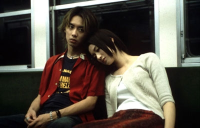
Kairo (Pulse) (Movie Review)
Now that a few years have passed since the heyday of J-Horror, we can look back at it more objectively, free of the fanboyism that a lot of us had at the beginning or the exasperation and boredom that most of us felt at the end when the novelty of a slow-moving, long-haired ghost had long since worn off. We’ve just arrived at the point
where we can begin to see where J-Horror will fit in horror history – will it be a trove of cinematic treasures that future horror fans will discover and watch obsessively for a few months or will it be a punchline for an aging Michael Ian Black on “I Love The 2000s”?
The pantheon of J-Horror was topped by three movies: “Ringu”, “Ju-on” and “Kairo”. All three reached iconic status in Japan and later, around the world, and all three had their own big-budget Hollywood remake, respectively “The Ring”, “The Grudge” and “Pulse”. “The Ring” might just be the most significant horror movie of the 2000s because its release set off two explosions that defined the decade. First of all, it triggered the remake craze in which all of sudden any horror film that was either foreign or more than 10 years old was on the fast-track to being remade with a prettier cast, a bigger budget and, more often than not, a PG-13 rating. Secondly, the success of “The Ring” led many people to seek out “Ringu” and other J-Horror titles. Thanks to DVDs and filesharing, foreign movies were no longer relegated to art house cinemas and the dustiest shelf in Blockbuster. If you wanted to see something bad enough, there was a way. Horror fans of the 2000s bucked the conventional wisdom of the industry and embraced subtitled foreign films with such a fervor that many of the most acclaimed horror films of the second half of the 2000s weren’t in English.
I was as fascinated with J-Horror as anyone. For about a year I plowed through as much J-Horror as I could but, as tends to be the case when you gorge yourself on anything, it wasn’t long before I was burnt out on the whole subgenre. J-Horror, like 80s slashers before it, was a case of diminishing returns. The first time you see a hazy, hitch-stepping ghost shuffling towards you it’s pantswettingly terrifying. The millionth time – not so much. So even though I devoured both high profile and obscure J-Horror movies (not to mention many of its illegitimate Korean, Chinese and Thai offspring), somehow I never got around to “Kairo”. Not that I cared. Internet-themed horror films tend to be awful (“Fear Dot Com” anyone?) and after a dozen or so J-Horror films I was beginning to doubt they had any new tricks.
Boy, was I was wrong. In a way I’m glad I didn’t see it until now because not having watched a hair ghost movie in ages has let them regain a little of their scariness that probably would be blunted if I’d watched this at the end of a steady diet of J-Horror. I’m so jaded to horror movies that I can usually only enjoy scare scenes in an intellectual way – I realize that the scene is probably very scary to people who haven’t spent weeks of their life watching horror movies but it doesn’t really affect me. The ghosts in this movie actually had my skin crawling and I found myself leaning back in my seat in a futile attempt to put some distance between them and me. That’s some good scarin’ there.
“Kairo” follows two plot threads which dovetail at the end. The first involves a rooftop plant nursery worker who goes AWOL. When Michi, one of his coworkers, goes to check on him, she finds him at home, oddly despondent and distant. When she turns her back for a second, he nonchalantly shuffles off to a corner and hangs himself. Later a different coworker goes to his apartment to investigate the dead man’s computer for clues about his seemingly motiveless suicide. At the apartment he finds a mysterious black stain on the wall at the suicide scene which sometimes looks like his dead friend and seems to be whispering “Help me.” The coworker finds a room sealed off with red tape and goes inside, where he meets a ghost which leaves him in the same listless and depressed state his friend was in. Michi continues her investigation even as around her more and more people fall into this sudden state of suicidal despair.
Meanwhile, a student named Kawashima , apparently the last person in Japan to sign up for the internet, finally caves in and gets a dial-up connection. When he logs in, his computer glitches and shows him what seem to be webcam images of people sitting in their rooms suffering from the same lonely state as Michi’s friend. Later, during the night his computer powers on and attempts connect to the internet on its own. Confused by this, he goes to his university computer lab and meets a foxy IT student named Harue who is intrigued by his story and wants to help him.
It’s only gradually noticeable that as these two storylines play out, Tokyo is rapidly being depopulated in the background. By the end of the movie, the streets and shops are deserted and there’s hardly any comment on what has happened and where everyone has gone. “Kairo” is as much an apocalypse movie as it is a ghost movie. A few characters pop up and give their take on the situation but then they too disappear and there is never any definitive word as to what is happening.
Technophobia is a major theme of J-Horror and “Kairo” nails the social commentary angle by keeping it in the background and letting the audience discover it on their own. It’s a biting indictment of the self-imposed isolation and separation that modern technology brings, where we hide behind a wall of gadgets and electronics and make only the most superficial connections with each other. In a way, “Kairo” is all background. The protagonists of the movie aren’t so much heroes as they are victims who can’t make sense of what’s happening, much less stop it. What’s more, every shadow or dark place on the screen seems like it could be hiding a ghost who refuses to do us the favor of jumping out, scaring us and getting it over with, but instead takes the far more disturbing course of just standing there and blankly staring.
“Kairo” does have its flaws. There are elements of the plot which I still don’t understand. That doesn’t bother me too much but will be a deal-breaker for many people. There isn’t much effort to round out the characters – although their flatness does fit well with the movie and could be argued to be a deliberate choice. One thing that can’t be excused is that “Kairo” has the pacing issues that plague most J-Horror movies and would benefit immensely from losing about 15- 20 minutes. That said, the story works beautifully both on the surface and as an allegory, the score and sound design are brilliantly spooky and the final encounter with a ghost earns its scares not through boos or shocks or gore but through a sense of slow, deliberate, existential dread. That’s not something you get in most horror films.
If, like me, you avoided “Kairo” due to hair-ghost overload, you’re missing out on a film that manages to be atypical of the trend while exemplifying it and might just be the high point of the J-Horror subgenre.

